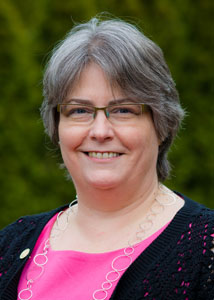 September is Arthritis Awareness Month. Catherine Backman, a UBC Professor in the Department of Occupational Science and Occupational Therapy, will be this year’s distinguished lecturer at the Annual Scientific Meeting of the Association of Rheumatology Health Professionals (ARHP), being held this November in Washington, D.C.
September is Arthritis Awareness Month. Catherine Backman, a UBC Professor in the Department of Occupational Science and Occupational Therapy, will be this year’s distinguished lecturer at the Annual Scientific Meeting of the Association of Rheumatology Health Professionals (ARHP), being held this November in Washington, D.C.
We caught up with Dr. Backman to ask her about her interest in arthritis, common misconceptions about the disease and interventions that could help people living with arthritis. Dr. Backman’s lecture at this year’s ARHP meeting is entitled: “Doing, Being, Participating: State of the Science.”
Tell us about your background and research focus.
I’m an occupational therapist and my research focuses on the impact of chronic illness — particularly arthritis — on participation in social roles like employment, parenting, and leisure activities. I’m also interested in the effect of occupational therapy and rehabilitation interventions to enable people to engage in the activities they need and want to do as part of their daily lives.
As an occupational therapist by trade, what interests you about arthritis? What led you to take research in this area on?
My first job as an occupational therapist was on a rheumatic diseases in-patient unit. I was part of an interprofessional team that worked with patients to set goals and develop plans to help them return to whatever was most important to them. Today, we hear a lot about interprofessional teamwork and patient or client-centred care, but a lot of rheumatology units and clinics were at the forefront of team-based care four decades ago.
Seeing some of the devastating effects of arthritis on people’s ability to do the simplest tasks, and wondering if my interventions were making a real difference is a big part of what motivated me to further my research education and design studies to answer those questions.
What is a common misconception people have about arthritis?
Many people think arthritis is part of normal aging, or arises from old sports injuries. While the rate of arthritis increases with age, and many injuries do contribute to osteoarthritis, arthritis should not be accepted as normal aging. There are over 100 types of arthritis, and these conditions affect people of all ages, from infants and young children to older adults. Some are systemic, inflammatory conditions that are very serious and can contribute to premature death. Arthritis and musculoskeletal conditions are the biggest cause of activity limitations and disability in Canada. Early intervention, including appropriate medications, education and rehabilitation, is critical to minimize disability.
What types of interventions can help people with arthritis?
Good medical management is critical for most types of arthritis – doctors and pharmacists are the experts here. Regular physical activity helps maintain strength and reduce pain and fatigue. Ergonomic modifications, planning ahead, pacing activities, and assistive devices help many individuals manage work, school, household tasks, and socializing with greater ease. Hand exercises, heat or cold applications to stiff or painful joints, and custom-fitted splints to rest or stabilize vulnerable joints are other examples of interventions that help some people with arthritis.
September is Arthritis Awareness Month. What is one thing you want people to be more aware of regarding this disease?
There are about 5 million Canadians living with arthritis. Probably half to two-thirds of them experience difficulties with daily activities the rest of us take for granted, and for many, pain and fatigue are pretty constant companions. Research has improved care immensely since I started my career, but the proportion of funds directed to arthritis research is out of sync, much lower, than the proportion of Canadians affected.
You were recently invited to be the distinguished lecturer at this year’s Annual Scientific Meeting of the Association of Rheumatology Health Professionals (ARHP) in Washington, D.C. Can you tell us a bit about what you will be sharing?
My plenary talk is titled “Doing, Being, Participating: State of the Science.” I’ll be talking about the current research evidence on the impact of arthritis on doing everyday activities, how this affects people’s identity, and their participation in their chosen occupations and activities. Most types of arthritis are persistent, chronic conditions. While remission is possible, many people have found arthritis changes the way they do things, sometimes resulting in disruptions that cause them to lose their sense of self as they give up jobs or adjust life roles. The goal of occupational therapy is to help people sustain satisfying lives, doing what’s important, fun, or interesting to them at every stage of life.
Is there any truth to the old wives’ tale that cracking your knuckles causes arthritis?
There’s no evidence that cracking knuckles causes arthritis, although there have been some reports that habitual knuckle-crackers have injured their joints.
Dr. Catherine Backman is a Professor and former Head of the Department of Occupational Science and Occupational Therapy. She is also a senior scientist at Arthritis Research Canada (ARC) and a fellow of the Canadian Association of Occupational Therapists (CAOT). Dr. Backman has been recognized for her contributions to the field of occupational therapy with the 2004 Muriel Driver Lectureship and the 2009 Distinguished Scholar Award from the Association of Rheumatology Health Professionals (ARHP). She is a member of the Canadian Society of Occupational Scientists (CSOS), the Canadian Bioethics Society and an affiliated investigator at the Vancouver Coastal Health Research Institute (VCHRI).